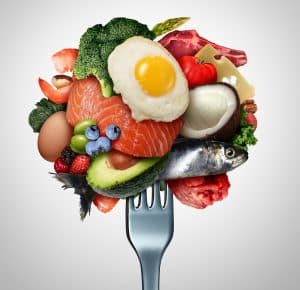
If I am on the high fat low carb diet, what should I be eating during prolonged exercise?
The question of what one should eat during prolonged exercise if you’re following this diet is one that I receive very frequently. My experience is that there appears to be two responses to athletes on this diet as far as their performance and their need for carbohydrates before and during exercise is concerned.
The one group become very well adapted to fat burning and are able to burn so much fat during exercise that they do not need to ingest carbohydrates at all during exercise. Instead, if they feel the need to eat during exercise (which I don’t think is necessary unless the activity lasts more than about 4 hours), they simply eat the same foods during exercise that they would normally snack on during the day. This might be high fat protein foods like nuts, biltong (jerky or even better, pemmican), cheese, bacon (fried), milk etc. In time someone will produce pemmican, which was the original food for endurance performance (and for soldiers fighting wars) right up to the Second World War when it was replaced (at least in the USA) by the sugary K(eys) Rations, which contain processed carbohydrates and little fat, and perhaps reinforced the (incorrect) idea that refined carbohydrates, not fat, should be ingested during prolonged exercise.
The other group finds that they are not able to perform as well on the low carb diet unless they add SOME carbohydrate before and during exercise. So they find that ingesting 100-200g of carbs during the last 24 hours before the race is beneficial. They may also take in some carbs during the race (25-50g/hr). This can come from a sports drink or a Gu or from high carb foods like bananas. Some athletes will combine elements of both approaches. Thus I gather that, increasingly, professional cyclists will follow low carbohydrate diets or even fasting on the days they perform long distance training at a constant pace, but before days of high intensity training they may add some carbs before and perhaps during training. Similarly, during long stage races, they will increase the amount of carbs they ingest during the final hours.
My advice is that it is much more convenient to eat only fat and protein during exercise and not to be dependant on a continuous supply of carbs (as is necessary in those who are carb-adapted/dependant) and so this is the outcome one should aim for. But if it is not possible, then go the limited carbs route.
But the key is to experiment with the two different options and to decide what works best for you.
Note: I will always promote lower carbohydrate diets for the majority of athletes because I am concerned that eating a high carbohydrate diet for decades in the hope of improving athletic performance may simply cause the development of Type 2 diabetes in those who, like myself, are insulin resistant. Those who are absolutely certain that they are not, in the least, insulin resistant may get away with it. But the majority may not be as lucky.
Written by Prof Timothy Noakes OMS
MBChB, MD, DSc, PhD(hc), FACSM, (hon) FFSEM (UK), (hon) FFSEM (Ire)
(Updated April 2019)
